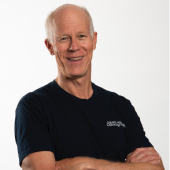
Four years of selectively breeding for high-yield and sporeless sugar kelp (Saccharina latissima)
Scott Lindell, Research Specialist, Woods Hole Oceanographic Institution, USA

Four years of selectively breeding for high-yield and sporeless sugar kelp (Saccharina latissima)
Scott Lindell, Research Specialist, Woods Hole Oceanographic Institution, USA
About the speaker:
Scott Lindell led a Scientific Aquaculture Program at the Marine Biological Laboratory in Woods Hole for 15 years where he researched new methods for seaweed and shellfish farming. His R&D program over the last 7 years at the Woods Hole Oceanographic Institution takes a multi-disciplinary approach to practical ocean farming challenges that typically requires cooperation between commercial and academic partners. Current projects include demonstration projects for sugar kelp in Alaska, tropical seaweeds in Puerto Rico, and leading a selective breeding program for sugar kelp in New England.
Company info:
Established in 1930, Woods Hole Oceanographic Institution (WHOI) on Cape Cod is the largest private nonprofit ocean research, engineering, and education organization in the world today with over 1,000 employees.
Presentation:
Seaweed farming in the Gulf of Maine has expanded rapidly over the past decade. As part of ARPA-E’s MARINER program, we have conducted a selective breeding program to improve the productivity and composition of sugar kelp, which could serve new markets for food, animal feeds, bio-products, and eventually biofuels. We maintain about a thousand monoclonal gametophyte cultures that can be used as parents for generating crosses. Kelp crosses were planted in “common garden” farm arrays over four seasons (2018 through 2022) in New Hampshire, USA. A summary of trait measurements and analyses of yield, composition and morphology for 1,008 family plots and over 12,000 individual kelp blades will be presented. One highlight is that several plots exceeded 20 kg/m harvest wet weight with the top plot weighing 28 kg/m or 4 kg/m dry weight – about 4 times the commercial average. We have used pedigree, genotypic marker data, and harvest phenotypes to estimate breeding value of parents and predict offspring performance. Ultimately, we are meeting goals of improving yields of dry matter per unit area more than 20% per generation. We have sequenced the whole genome of ~500 parents, tested their crosses, and phenotyped harvests to begin building a publicly available database for cooperative breeding (sugarkelpbase.org). We have also completed an annotated reference genome for sugar kelp that enables the identification of natural mutations on targeted genes to potentially create non-reproductive sporophytes. Using sterile, or “sporeless” sporophytes open opportunities for more productive farms while protecting natural genetic diversity.
Keywords:
Genomics, kelp, yield improvement, traits, reference genome, gene bank, sterility